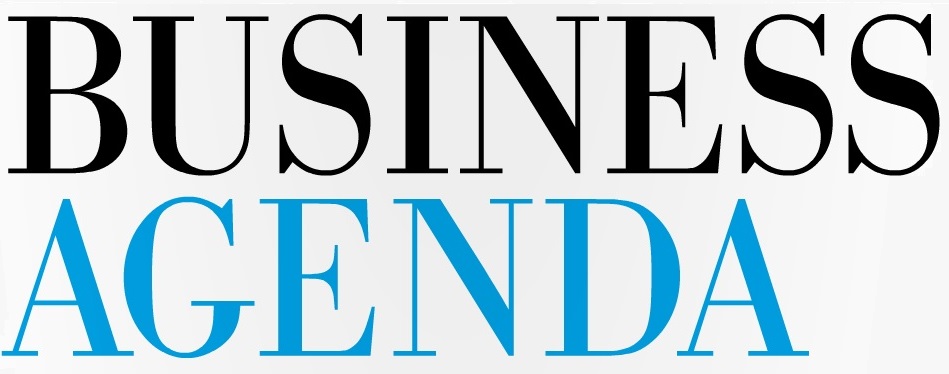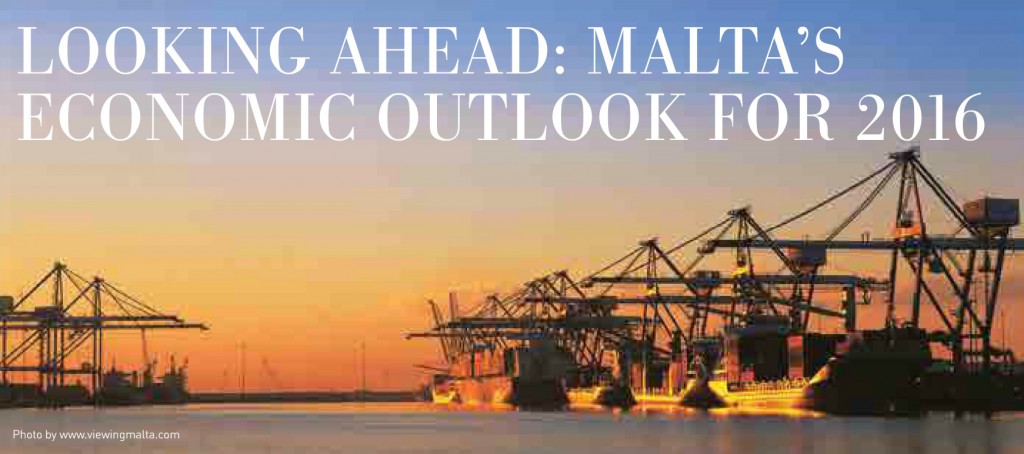A new year is just around the corner and everyone is eager to ensure that the thriving Maltese economy remains on the up. Marie-Claire Grima speaks to two of the most influential figures in the Maltese business landscape to find out more about the nation’s economic prospects for 2016.
As the end of the year rolls around, a quick glance at Malta’s economy finds it to be in a generally robust condition. While the stalwart backbone of tourism continues to bring in the bulk of the national income and breaks records year after year, Malta’s economy has become significantly more diversified in recent times and is seeing exceptional results from a number of sectors. The remote gaming industry is at the helm of these super-performers – it was confirmed in 2014 to be the second-largest contributor to the national economy, and continues to bring in 12 per cent of the GDP. Back office service providers, financial services operators and a film industry whose recurring description as ‘burgeoning’ trivialises its substantial contribution to Malta’s coffers all remained steadily successful earners in 2015.
Furthermore, the Budget for 2016 which was announced in October predicted that GDP growth and fiscal inflation would continue to climb after a strong year, while unemployment and the budget deficit would keep gradually shrinking. It also included a number of measures aimed at promoting business growth, including financial incentives for businesses investing in R&D and knowledge transfer partnerships, as well as tax credits for would-be entrepreneurs.
“We can’t give everything to everybody at the same time. Flinging business-boosting incentives every otherway and hoping that they stick to something is a waste of our resources.” – Edward Scicluna
Anton Borg, President of the Chamber of Commerce, Enterprise and Industry confirms that the majority of Malta’s economic sectors are doing well, fuelling the current positive business climate and producing exceptional results. “Economies move in cycles, and Malta’s economy is currently experiencing one of the biggest crests in its history,” he says. However, he is worried that Malta is about to fall victim to its own success. Its current economic boom, he argues, is giving rise to a widespread climate of passivity and inaction. Rather than taking concrete action to make sure that growth, stability and investment maintain their upward course, policymakers seem more than content to believe that the situation will remain the same way without requiring any significant action to be taken on their part.
“Now is the time to work hard to make sure that Malta retains its present attractiveness for local and foreign business investment, in order to ensure future growth. We weathered the 2008 financial crisis and the chaos that ensued comparatively well, thanks to strong foundations that had been laid in more prosperous times. Back then, we were surrounded by countries that were all floundering and gasping for air, while we went on with our business much the same as before. But since then, those same countries have taken measures to restore and rebuild their economies which are finally paying off. They’re getting back on their feet with renewed strength, far more prepared to compete than ever before.”
Mr Borg says that while the Government expresses agreement with the proposals that the Chamber put forward to ensure such growth, it is often largely a question of lip service. He mentions a proposal put forward by the Chamber, for the Government to match companies’ R&D investment with double the sum in capital allowance – a proposal which would have the bonus benefit of allowing the level of R&D carried out in Malta to be more accurately gauged. The proposal was also backed by the Malta Council for Economic and Social Development (MCESD). However, it did not so much as receive an acknowledgement in the Budget for 2016. “It’s very easy to nod and concur, and then sit back and do nothing,” he says. “There’s no sense of urgency being registered at higher levels at all. There are economic and fiscal strategies that we have to start sowing now so that we can reap them further down the line. If we have to perform feats of crisis management when disaster strikes, they will be ten times harder to pull off.”
Several recent studies prove that Mr Borg’s concerns are not unfounded. This year, Malta was ranked by the World Bank as the 95th most difficult country to do business in out of the 189 nations surveyed, proving that despite its economic triumphs, Malta’s business environment remains bogged down by the endemic problems of endless bureaucracy and unwieldy procedures. The necessary framework and will to enforce contracts remains feeble and lacking, credit is difficult to acquire and successive governments have been dogged by accusations of corruption, nepotism and political favours. Malta was also among the lowest scorers in the European Digital City Index which measured digital business environment, entrepreneurial culture, mentoring and managerial assistance and non-digital infrastructure in 35 different European locations.
While acknowledging that there are areas where Malta still lags far behind, Finance Minister Edward Scicluna offers a sharp rebuttal when challenged that the Government isn’t doing enough to secure and maintain future economic growth. “When a patient is haemorrhaging, you have to stop the blood loss before tending to any other ailment. It’s the same with the economy – we have been making it a point to address the areas where Malta is weakest and most vulnerable first and foremost.”
These issues, he says, include a lack of energy and fuel efficiency, low rates of female participation in the workforce, a cohort of graduates that was either under-skilled or whose skills did not meet current demands, bureaucracy and inconsistency across the board, and a highly overburdened infrastructural system. “These are all matters that require our immediate attention. We are trying to prioritise the problems that need to be tackled with urgency, and we have to do so whilst ensuring that Malta is living within its means. And that is what our past set of Budgets aimed to achieve. But wecan’t give everything to everybody at the same time. Flinging business-boosting incentives every otherway and hoping that they stick to something is a waste of our resources. Instead, we’re monitoring the economy and ensuring that it grows at a steady rate, which will lead to an eventual convergence with the European average.”
Prof. Scicluna says that in order to avoid being caught in a downward spiral after the success of the past few years, Malta has to start investing in sectors which are still developing orstabilising. He has an ambitious vision for the next phase of Malta’s economy, an avenue which is only possible thanks to the international standard that its service sector has reached. “The high standards Malta now holds in accountancy, legal and IT fields mean that any company of any size can find itself suitably serviced if it chooses to base itself here. I imagine Malta not quite as a business hub but more as a base camp, in the mountaineering sense of the word. Politically, socially and geographically, we’re very well-positioned to serve as a safe haven for people who want to operate in more risky parts of the world especially those still quite close to us, including North Africa and the Middle East. We can give these investors a safe place to return to.”
“Now is the time to work hard to make sure that Malta retains its present attractiveness for local and foreign business investment, in order to ensure future growth.” – Anton Borg
He adds that there are already plans to invest in medical and tertiary education tourism over the next few years, sectors which will drive Malta’s economy and prevent it from running out of steam. “There’s a big demand for these kinds of services in our region. We will be able to provide the services that destinations like London can offer, except we’re in the Mediterranean. This puts us in the advantageous position of being both closer to and more like home for these investors, offering the same level of service at a more reasonable price.” Strong medical and tertiary education tourism sectors, he says, will be able to make up for the weak points that are ever-present in the area of mainstream tourism, including the lack of activity during the off-peak months.
Prof. Scicluna concedes that there will always be forces beyond the nation’s control influencing the way that Malta’s economic vision plays out in 2016 and beyond, including the changing regulatory landscape within the banking industry, as well as challenger countries which, upon seeing the increasingly international investor profile Malta is drawing, feel entitled to a slice of the pie. However, he remains upbeat and optimistic. “Making Malta an attractive place for foreign investment is not a one-time thing. We cannot relax our efforts, or else we will find the tide turning against us. But while there will always be obstacles and threats to be faced, I am confident that Malta has enough resources and talent to overcome them.”
– Friday, 27th November, 2015


One response to “Looking ahead: Malta’s economic outlook for 2016”
Very interesting details you have mentioned, regards for posting.Expand blog